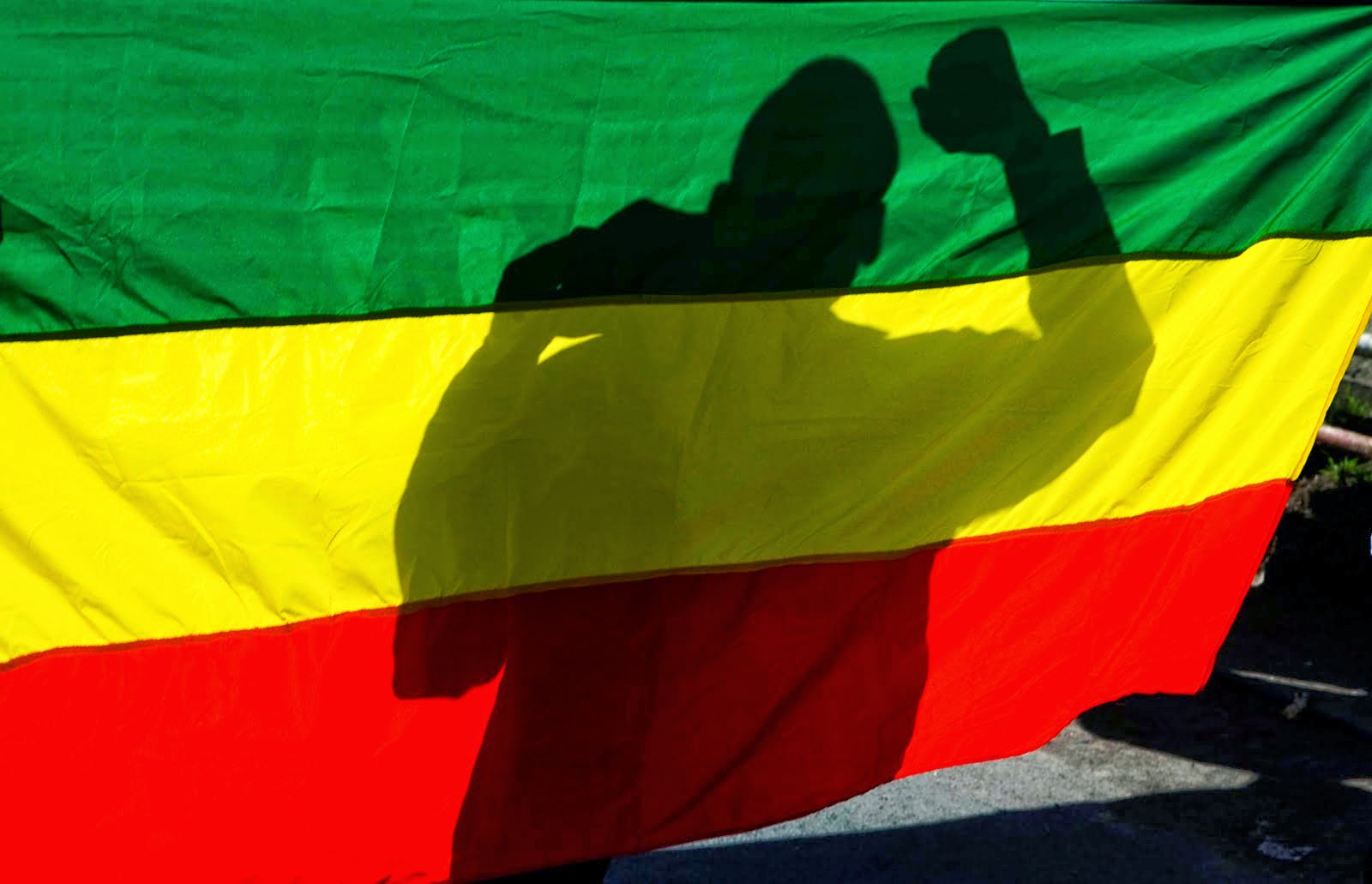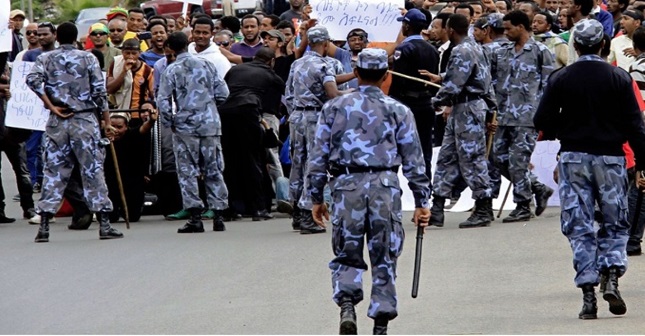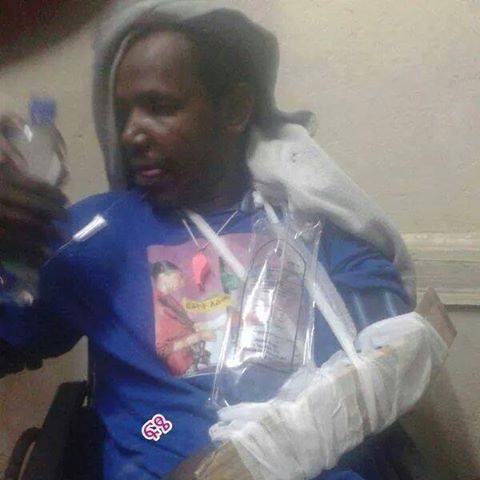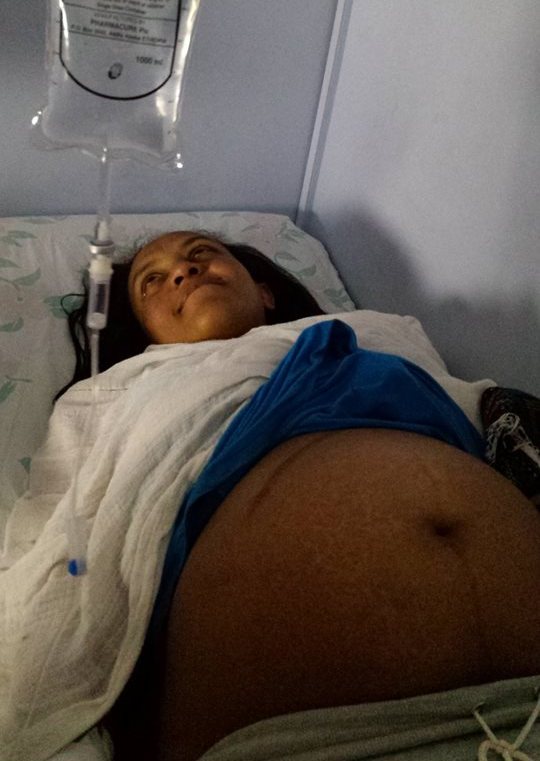The Guardian
The low social STATUS of Ethiopian women lies at the root of violence against them and the tragic cases of two teenagers have galvanised female activists in their efforts to tackle it
of Ethiopian women lies at the root of violence against them and the tragic cases of two teenagers have galvanised female activists in their efforts to tackle it
 of Ethiopian women lies at the root of violence against them and the tragic cases of two teenagers have galvanised female activists in their efforts to tackle it
of Ethiopian women lies at the root of violence against them and the tragic cases of two teenagers have galvanised female activists in their efforts to tackle it
William Davison, January 27
Tejnesh Leweg’neh, a 15-year-old from Ethiopia’s mountainous northern Shoa region, was abducted by three men on her way to market in October. They tried to force her to agree TO MARRY one ofthem. She refused, and, a day later, they pushed her off a cliff. Now Tejnesh is paralysed from the waist down.
one ofthem. She refused, and, a day later, they pushed her off a cliff. Now Tejnesh is paralysed from the waist down.
THAT same month, 16-year-old Hanna Lalango, from Ethiopia’s cosmopolitan capital, Addis Ababa, was abducted by a group of men from a minibus on the outskirts of the city. She was raped over several days and died in hospital about a month later from her injuries. Five men have been convicted and are awaiting sentence for the attack. Hanna reportedly identified her assailants before she died.
same month, 16-year-old Hanna Lalango, from Ethiopia’s cosmopolitan capital, Addis Ababa, was abducted by a group of men from a minibus on the outskirts of the city. She was raped over several days and died in hospital about a month later from her injuries. Five men have been convicted and are awaiting sentence for the attack. Hanna reportedly identified her assailants before she died.
 one ofthem. She refused, and, a day later, they pushed her off a cliff. Now Tejnesh is paralysed from the waist down.
one ofthem. She refused, and, a day later, they pushed her off a cliff. Now Tejnesh is paralysed from the waist down.THAT
 same month, 16-year-old Hanna Lalango, from Ethiopia’s cosmopolitan capital, Addis Ababa, was abducted by a group of men from a minibus on the outskirts of the city. She was raped over several days and died in hospital about a month later from her injuries. Five men have been convicted and are awaiting sentence for the attack. Hanna reportedly identified her assailants before she died.
same month, 16-year-old Hanna Lalango, from Ethiopia’s cosmopolitan capital, Addis Ababa, was abducted by a group of men from a minibus on the outskirts of the city. She was raped over several days and died in hospital about a month later from her injuries. Five men have been convicted and are awaiting sentence for the attack. Hanna reportedly identified her assailants before she died.
Both these crimes were brought to light by an energised network of mostly female Ethiopian activists trying to advance women’s rights and reduce sexual harassment in the Horn of Africa country.
“What united us is we believe this is our problem, it’s our responsibility to change this,” says one of them, Selam Mussie. “We all are Hannas – this could have been any of us.”
Mussie, an administrator at the International Community School in Addis Ababa, is part of the Justice for Hanna campaign.
Activists view these violent attacks as a consequence of a culture THAT places women in subordinate positions to men, which often manifests itself in the form of the frequent petty harassment they endure on the capital’s streets.
places women in subordinate positions to men, which often manifests itself in the form of the frequent petty harassment they endure on the capital’s streets.
 places women in subordinate positions to men, which often manifests itself in the form of the frequent petty harassment they endure on the capital’s streets.
places women in subordinate positions to men, which often manifests itself in the form of the frequent petty harassment they endure on the capital’s streets.
“There are certain places that most of us are terrified of passing through because there are tens of men sitting around to purposely make a woman passerby uncomfortable,” says Mussie, 24. “It STARTS from common catcalls, to dissing, to a physical level where they could follow to grab or touch private parts.”
from common catcalls, to dissing, to a physical level where they could follow to grab or touch private parts.”
 from common catcalls, to dissing, to a physical level where they could follow to grab or touch private parts.”
from common catcalls, to dissing, to a physical level where they could follow to grab or touch private parts.”
Liya Hailemariam, a 24-year-old activist who works in PR, says she frequently suffers attention on public TRANSPORT . “And it’s not just words – people somehow just slide in their hands,” she says. “We sort of consider it normal, we pass it off as this stupid guy, this pervert.”
. “And it’s not just words – people somehow just slide in their hands,” she says. “We sort of consider it normal, we pass it off as this stupid guy, this pervert.”
 . “And it’s not just words – people somehow just slide in their hands,” she says. “We sort of consider it normal, we pass it off as this stupid guy, this pervert.”
. “And it’s not just words – people somehow just slide in their hands,” she says. “We sort of consider it normal, we pass it off as this stupid guy, this pervert.”
Using the momentum created by the outrage at Hanna’s death, activists WANT TO encourage women to speak out against the routine harassment they suffer in the belief it will reduce serious abuse. “If you fail to stop the little things, you’re literally encouraging people to do this,” said Hilina Berhanu, 22, who is part of the Yellow Movement fighting for women’s rights at Addis Ababa University and president of another group, Women for Change.
encourage women to speak out against the routine harassment they suffer in the belief it will reduce serious abuse. “If you fail to stop the little things, you’re literally encouraging people to do this,” said Hilina Berhanu, 22, who is part of the Yellow Movement fighting for women’s rights at Addis Ababa University and president of another group, Women for Change.
 encourage women to speak out against the routine harassment they suffer in the belief it will reduce serious abuse. “If you fail to stop the little things, you’re literally encouraging people to do this,” said Hilina Berhanu, 22, who is part of the Yellow Movement fighting for women’s rights at Addis Ababa University and president of another group, Women for Change.
encourage women to speak out against the routine harassment they suffer in the belief it will reduce serious abuse. “If you fail to stop the little things, you’re literally encouraging people to do this,” said Hilina Berhanu, 22, who is part of the Yellow Movement fighting for women’s rights at Addis Ababa University and president of another group, Women for Change.
There is uncertainty over the rates of abuse against women in Ethiopia due to inadequate data collection and under-reporting. A 2013 government report said 50-60% of all women had experienced domestic violence. It found “the underlying cause is the low level of STATUS given to women in society coupled with the dominant position of men further justified by culture and religion”.
given to women in society coupled with the dominant position of men further justified by culture and religion”.
 given to women in society coupled with the dominant position of men further justified by culture and religion”.
given to women in society coupled with the dominant position of men further justified by culture and religion”.
The activists say the government’s attitude towards violence against women is mixed. Although the state has made strides in empowering women economically and reducing harmful practices, such as female genital mutilation, police and judges remain largely unresponsive. “Rape is not taken seriously by the police,” Ruth Bekele, another activist, says. “I was going to report one case and was told ‘we have 1,000 rape cases this week’. It’s like they don’t care.”
She also believes violence against women needs to be more severely punished. “When someone slaps a woman they should get a big sentence, but here they will probably tell you not to do it again,” she says. “Today’s a slap andtomorrow’s a murder – I think that is what’s allowing people to go out and do worse.”
The Yellow Movement was STARTED by a law lecturer and students following the case of Aberash Hailay, a flight attendant who had her eyes gouged out by her jealous former husband in 2011. The group regularly discusses rights and sexuality with students at the university and is working to promote girls’ education by fundraising to provide sanitary items and stationery for girls who can’t afford them. “When you WANT TO
by a law lecturer and students following the case of Aberash Hailay, a flight attendant who had her eyes gouged out by her jealous former husband in 2011. The group regularly discusses rights and sexuality with students at the university and is working to promote girls’ education by fundraising to provide sanitary items and stationery for girls who can’t afford them. “When you WANT TO fight violence you have to empower people,” Berhanu says. “It’s not just about negative issues.”
fight violence you have to empower people,” Berhanu says. “It’s not just about negative issues.”
 by a law lecturer and students following the case of Aberash Hailay, a flight attendant who had her eyes gouged out by her jealous former husband in 2011. The group regularly discusses rights and sexuality with students at the university and is working to promote girls’ education by fundraising to provide sanitary items and stationery for girls who can’t afford them. “When you WANT TO
by a law lecturer and students following the case of Aberash Hailay, a flight attendant who had her eyes gouged out by her jealous former husband in 2011. The group regularly discusses rights and sexuality with students at the university and is working to promote girls’ education by fundraising to provide sanitary items and stationery for girls who can’t afford them. “When you WANT TO fight violence you have to empower people,” Berhanu says. “It’s not just about negative issues.”
fight violence you have to empower people,” Berhanu says. “It’s not just about negative issues.”
Women for Change, which began in September 2013, holds events where successful businesswomen talk about their path to the top. Bekele, who is part of the group, is also talking to a GALLERY about holding an exhibition to “fight violence through art”.
about holding an exhibition to “fight violence through art”.
 about holding an exhibition to “fight violence through art”.
about holding an exhibition to “fight violence through art”.
Every Saturday, the Justice for Hanna campaigners visit a state school to give language lessons to poor-performing children, discuss women’s rights issues with them and develop a club to discuss gender equality.
But it is going to take more to change ingrained attitudes on the streets from some men who still think rape is a woman’s fault.
“Women are most RESPONSIBLE for rapes as they ask for it,” says Tadele Tagota, a married 42-year-old grocer in Addis. Provocative dressing and promiscuous behaviour from teenage girls leads to controversial sexual encounters, he believes.
for rapes as they ask for it,” says Tadele Tagota, a married 42-year-old grocer in Addis. Provocative dressing and promiscuous behaviour from teenage girls leads to controversial sexual encounters, he believes.
 for rapes as they ask for it,” says Tadele Tagota, a married 42-year-old grocer in Addis. Provocative dressing and promiscuous behaviour from teenage girls leads to controversial sexual encounters, he believes.
for rapes as they ask for it,” says Tadele Tagota, a married 42-year-old grocer in Addis. Provocative dressing and promiscuous behaviour from teenage girls leads to controversial sexual encounters, he believes.
Some men have questioned whether Hanna had A RELATIONSHIP with one of her rapists. “Now it’s been blown up, but if she hadn’t died, it would not have been a big issue,” says Zacharias Haile, a 30-year-old civil servant.
with one of her rapists. “Now it’s been blown up, but if she hadn’t died, it would not have been a big issue,” says Zacharias Haile, a 30-year-old civil servant.
 with one of her rapists. “Now it’s been blown up, but if she hadn’t died, it would not have been a big issue,” says Zacharias Haile, a 30-year-old civil servant.
with one of her rapists. “Now it’s been blown up, but if she hadn’t died, it would not have been a big issue,” says Zacharias Haile, a 30-year-old civil servant.
A young off-duty police officer, who asked to remain anonymous because of the nature of his work, says under-reporting adds to the problem. He says families can hide or punish young teenagers to avoid shame when they report sexual assault by relatives. “Even if you get evidence, everyone is protecting each other as they don’t want to lose social standing,” he says.
Attitudes like these show “how weak society’s awareness about gender-based violence is and its consequences”, says Mussie. “Victim blaming is very COMMON .”
.”
 .”
.”
Tejnesh is now living in Addis with her aunt. Three men are now in custody for her attack. Campaigners have raised £980 for medical treatment, and a wheelchair has been purchased from the US, where they are cheaper. The Justice for Hanna group gave her a mattress so she could sit more comfortably.
The challenge for activists now is to keep up the momentum for action. Bouts of national soul-searching following previous horrific incidents – such as that of Hailay – fizzled out quickly. This time will be different, they vow. “We all made a commitment. We said we are not going to QUIT ,” Hailemariam says
,” Hailemariam says
 ,” Hailemariam says
,” Hailemariam says
http://ethioforum.org/ethiopias-women-vow-to-turn-tide-of-violence-rape-and-murder/








